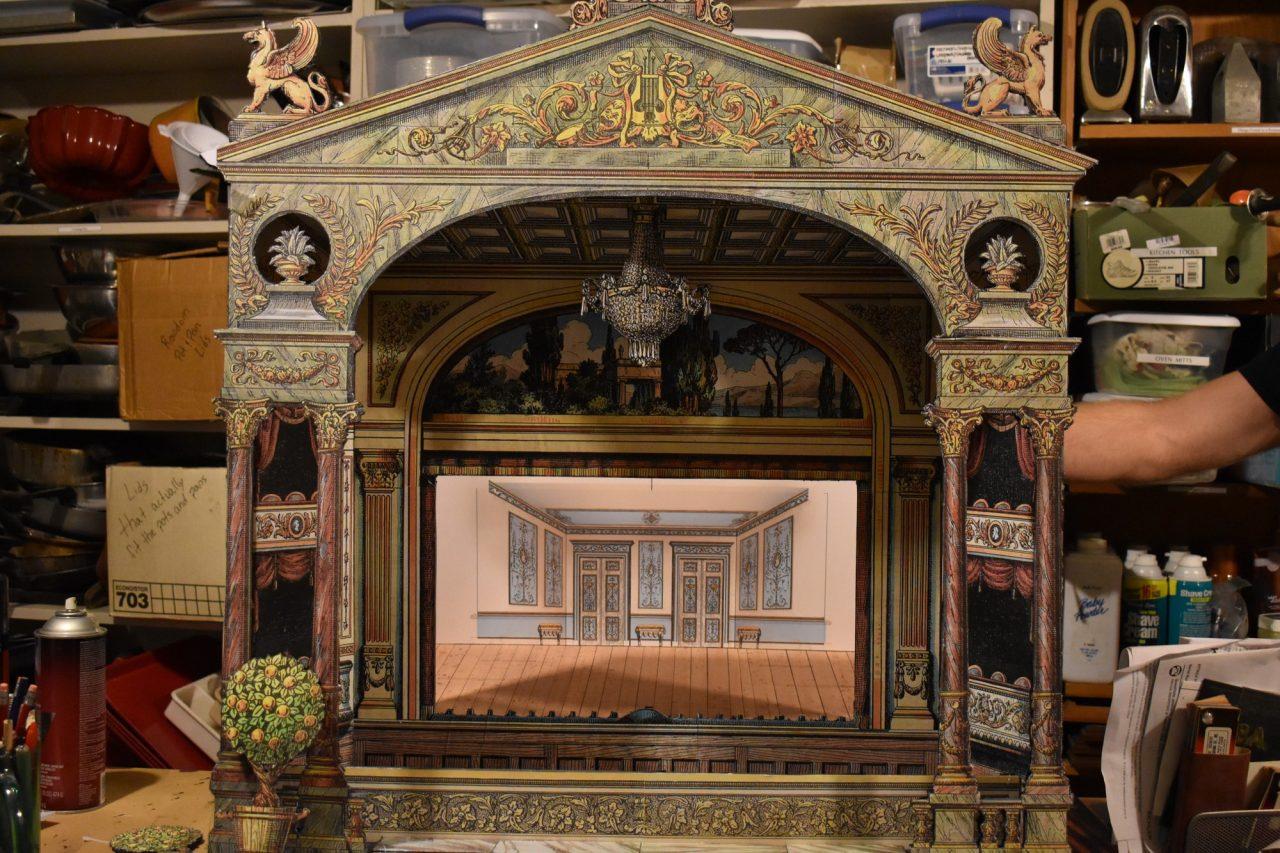photo provided by the theatre department
After students moved to virtual learning last semester, the theatre department’s plans for their second mainstage production “Tartuffe” by Molière was cut short. Fortunately, the department has been rehearsing for “Tartuffe” after a series of unexpected and creative changes.
Dr. Stacey Connelly, associate professor of human communication and theatre and director of “Tartuffe,” a French play based on religious hypocrisy, has found safe ways to still be able to put on rehearsals.
“Scott Neale, our scenic designer, has created a standing 3D stage that looks like a 17th-century French theater using a 3D printer. It’s very elaborate and beautifully designed with wings on the side. All the actors will have their own green screen and the interior of the theater will be projected onto the green screen,” Connelly said.
Using the crafted stage, puppet shows are going to be implemented in place of scenes involving actions actors can’t do, such as physical interactions ranging from violence to intimacy, according to Connelly.
“The performers have to create their world within the small frame of about six feet. They have to almost be like a living picture in a portrait. What we’re trying to do is see how the actors can use their bodies to make it look as if they’re actually interacting. It has made me think of theater in terms of illusionism,” Connelly said.
Senior Anthony Tresca, who is playing the role of Tartuffe, and senior Trace Glorioso, who was cast as Orgon, both commented on the adaptability required to perform through Zoom.
“It’s hard to convey my character’s [motives], especially when it’s over “Zoom,” and I’m sitting in my room in my little rolly, spinny chair,” Tresca said. “It’s so important to adapt. If you do everything you were doing on a stage, it will be ineffective since it’s a different medium.”
“The term ‘the show must go on’ really is a thing. We’ve been working on some fun ideas involving the incorporation of our living spaces in our performance. When we’re so close to the camera like we are in Zoom, it’s also important to use facial expressions as much as we can, as our face is the only part of our body that the audience sees in our performance,” Glorioso said.
Although a virtual performance is not what the department had in mind, they are looking to make it as authentic as possible. First-year Nicolas Diaz, who is playing the role of Valere, has been optimistic about these changes.
“Valere is largely based on the Innamorato from commedia dell’arte. I am enjoying the role. Sometimes my internet acts up, which turns the show into an incomprehensible slide show, but other than that, there haven’t been any problems,” Diaz said. “In my mind, performing is performing, no matter the medium.”
Senior Kathleen Arbogast is playing the role of the officer. She is also one of the dramaturgs for the production along with Rafaela Brenner. Arbogast and Glorioso expressed the impact of Tartuffe’s verse.
“The play is written in rhymed verse, so as an actor, it’s difficult not to get caught up saying the lines in a sing-song-y way. You have to intentionally de-emphasize the rhyme so that you can put meaning and emotion into your lines,” Arbogast said. “Molière does a fabulous job of intertwining wit and religious commentary into this satirical masterpiece.”
“It is in my top three favorite roles I’ve played at Trinity. It fits the type of roles I play and allows me to be very over-the-top,” Glorioso said. “While the [verse] can be a little difficult to take in at first, the play is a great comedy. It’s kinda like a seventeenth-century reality TV show.”
Tresca, like other cast members, vocalized his gratitude for having the privilege to perform during these times.
“Just because the world is crazy doesn’t mean theatre should stop. I’m always thankful for the ability to blow off steam and just do some theatre, even if it’s not the same,” Tresca said.
Stay alert for an upload of the performance on their YouTube early next month.








David Nicholson • Oct 23, 2020 at 12:15 am
I’m disappointed that a university publication will report on a performance of Tartuffe, even discussing the rhyming scheme, without saying that they’re producing the translation of Richard Wilbur. Obviously Moliere is a classic genius, but what the audience will hear will be Wilbur’s words.